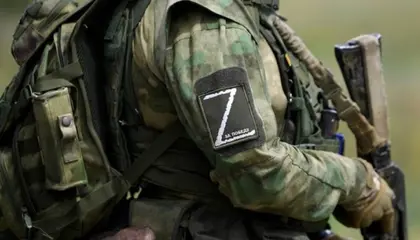A captured Russian soldier has claimed he was blackmailed into fighting in Ukraine and described the dire state of the Kremlin’s military which is facing a “significant number of desertions.
The interrogation of the Russian POW was shared in a video released by Major General Alexander Syrsky, commander of the Ground Forces of the Armed Forces of Ukraine, on Monday, August 28.
JOIN US ON TELEGRAM
Follow our coverage of the war on the @Kyivpost_official.
In it, the soldier says that he was under surveillance after his release from prison and when reporting for probation, was told he must either go to fight or be returned to jail for rigged drug offenses.
- Get the newest Ukraine news reports as of today.
- Check the most up-to-date Ukraine news reports from today.
"They can plant drugs. They can put powder or marijuana in the pocket," he explained.
He goes on to say that he signed a contract on July 13, 2022 and was promised that his criminal record would be cleared and he would receive a sum of 200 thousand rubles ($2,093). However, he was given just 37,500 ($392) instead.
He has also described a lack of proper training and discipline within the ranks of the Russian army.
"For two weeks, I was stationed in Budenovsk at the training grounds. I didn't receive instruction in tactics or medicine. I frequently returned home, spending a day or two there, then 2-3 days at home. Not everyone was granted this liberty," the Russian POW said.
"The instructors rarely allowed soldiers to go on leave to visit their families. They claimed that if they let 50 soldiers go, they would eventually have to hunt down 40 who wouldn't return. There was a significant number of desertions," he added.

Zelensky Meets CIA Director William Burns in Ukraine
He also said that given his educational background, he was promised to receive an officer's rank, which casts doubts on the thoroughness of the recruitment process.
"My battalion commander intended to bestow an officer's rank upon me due to my higher education," he said.
According to the captured soldier, assault units primarily consisted of convicts and repeat offenders. His initial assignment in Ukraine placed him in Severodonetsk in the Luhansk region.
"We were dispatched in two groups to clear out basements, in preparation for other units' deployment. Our task was to carry out what they referred to as tactical exercises," he recounted.
He explained that these "tactical exercises" involved dangerous manoeuvres and diversionary tactics.
"In hindsight, I realized that we were firing shots as a distraction, to allow other units to hear the shots and move in...well, generally, they had some sort of tactical strategy."
"Throughout the night, we were under the severe bombardment. I distinctly remember thinking: Why engage in tactical exercises? We needed to evacuate as swiftly as possible. We were bombarded with grenades; I sustained a concussion. As I tried to leave the basement, I was shot in the side."
Abandoned by his fellow soldiers, he was eventually captured by Ukrainian forces, who he said saved his life: "They administered painkillers and antibiotics. A surgical procedure will be performed to remove the bullet.
“Occasionally, they provide fruit. Cigarettes are also given, although, given the heat, I primarily request water."
You can also highlight the text and press Ctrl + Enter






